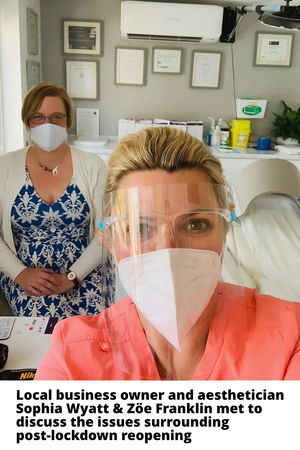The beauty industry - victim of gender bias in post-lockdown decision making on reopening?

A few weeks ago a local business owner, Sophia Wyatt of Sophia Wyatt Aesthetics, reached out to me by email to highlight the issues being faced by the beauty industry, which at the time was being prevented from reopening whilst hairdressers and barbers had already been given the green light to open their doors.
In her email she explained that the beauty sector is one that can be covid secure, already has the highest standards of hygiene on the High Street, and highlighted the fact that the industry contributes billions of pounds to the UK economy and supports over half a million jobs throughout the supply chain. It got me thinking...
The beauty industry is one that is largely run by women, for women and employs a largely female workforce. Could there be an element of gender bias, whether conscious or unconscious, in the decisions that have led to it not being allowed to reopen?
Before responding to Sophia I sat down and did some research. What I found started to suggest that the answer to my question was in fact 'yes'.
Soon after the reopening of Parliament in June various MPs began to highlight the issues the beauty industry was facing through questions to Government ministers. Some received a short, albeit unhelpful response, but on at least one occasion the PM Boris Johnson actually laughed at the question, following up his laugh with a dismissive comment about 'nail bars'. Further investigation also led me to an article written by Conservative MP Caroline Noakes on Conservative Home raising similar questions to me about whether there was gender-based disparity in the decisions being made towards opening up after lockdown - the comments were eye-opening, commentator after commentator (largely male) made dismissive or derogatory comments about the article.
I responded to Sophia's email and invitation to her studio to see the measures she had put in place to make it covid secure and protect her clients, and to discuss the challenges she and the beauty industry face in more detail, with a "yes" and we met up a couple of weeks ago.
Our conversation was wide-ranging and highly informative (thank you Sophia). She explained that businesses like hers were once again able to open but that they would not be able to give facial treatments. Yet barbers have been given permission to work on the face, on facial hair, for periods of time similar to that required to provide a beauty treatment for the face. She also explained that preventing facial treatments was not only severely impacting on the income of business like hers but also had the real potential of shutting down some beauty clinics and businesses permanently. Of course, the impact of either scenario is that primarily women would lose their source of income and employment.
Since we met the Government has announced that facial treatments will be allowed to resume from 1st August. However, I am concerned that decision making on this issue (and potentially others) has been hampered by gender bias and a lack of understanding of the industry by male Government leaders and the Government needs to act to address this. Specifically, it should:
- Review the decision-making process used and consider whether it has been skewed by intentional or unintentional gender bias and if so respond with clear actions of how they can prevent this happening again in future.
- Ensure that Government ministers are fully briefed by industry experts, in tandem with Government scientists and advisers, before making decisions on issues relating to industries such as this that they may not be as familiar with.
I am glad that businesses like Sophia's will be able to fully reopen from 1st August but I remain concerned at the lasting impact that the apparent gender bias of the Government in decision-making may have on the livelihoods of this predominantly female-led industry. I am also concerned by the questions it raises as to whether other decisions made by the Government in relation to tackling the coronavirus outbreak and the subsequent relaxation of lockdown have been similarly impacted, though that's for another blog piece - watch this space.
27th July 2020
